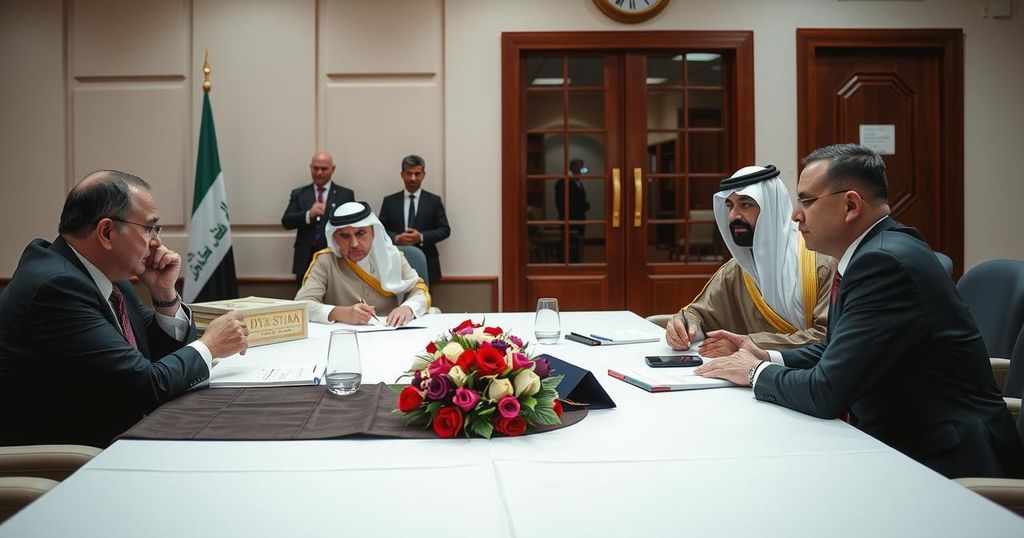Syrian Ministers Advocate for Lifting of US Sanctions During Qatar Visit

Syria’s transitional government ministers visited Qatar and urged the U.S. to lift sanctions on Damascus, stating that these undermine recovery efforts. Qatari officials expressed their support for Syria’s sovereignty and independence, while the Syrian leaders outlined plans for improved regional relations and governance. The visit marks a pivotal moment in diplomatic engagement following the ousting of President Bashar al-Assad.
During a significant diplomatic visit, ministers from Syria’s transitional government advocated for the United States to lift its sanctions on Damascus. This marked their inaugural trip to Qatar since the ousting of President Bashar al-Assad. Qatari Prime Minister Sheikh Mohammed bin Abdulrahman bin Jassim Al-Thani met with the Syrian interim Foreign Minister Asaad al-Shaibani, Defense Minister Murhaf Abu Qasra, and newly appointed Head of Intelligence Anas Khattab, emphasizing Qatar’s support for Syria’s sovereignty and independence. Shaibani articulated the standpoint of the transitional government, which is highly concerned that U.S. sanctions impede recovery efforts, stating that these measures pose a “barrier and an obstacle to the rapid recovery.” He further expressed hope for improved regional relations under the new government, contrasting sharply with previous ties during Assad’s tenure.
In late December, Qatar had also called for an expedited removal of sanctions against Syria as the international community remains cautious, closely observing the actions of the new authorities. The Syrian conflict, which erupted in 2011 following the regime’s violent response to peaceful protests, has complicated the region’s diplomatic efforts. Qatar previously supported the opposition, distinguishing itself from other Arab nations that reinstated relations with Assad’s regime. During his visit, Shaibani outlined a vision for a “clear roadmap” intended to stabilize and guide Syria’s governance moving forward, relaying optimism for fostering security and economic revitalization in collaboration with neighboring countries.
Additionally, Shaibani announced plans to meet officials in the United Arab Emirates and Jordan, indicating a broader diplomatic engagement aimed at building robust partnerships across the region.
The Syrian conflict began in 2011, following President Bashar al-Assad’s brutal crackdown on peaceful protests calling for democratic reforms. The subsequent civil war has drawn in numerous foreign powers and led to a complex geopolitical landscape. Qatar, which has been a staunch supporter of anti-Assad forces, has maintained a critical stance against the previously established Syrian regime. The recent establishment of a transitional Syrian government aims to re-engage diplomatically within the region, urging U.S. sanctions to be lifted to facilitate recovery and development. As the new administration seeks legitimacy, their interactions with Qatar may signal shifting alliances and a potential reopening of diplomatic channels previously severed during Assad’s rule.
In conclusion, the Syrian transitional government is actively seeking the removal of U.S. sanctions to enhance its efforts for recovery and stabilization. With significant backing from Qatar, which has refrained from recognizing the Assad regime, the new government is positioning itself to foster improved relations in the region. The outcome of these initiatives will pivot on how effectively the new authorities can consolidate power and demonstrate a commitment to governance that aligns with international expectations. The diplomatic overtures signify a critical step in reshaping regional dynamics post-conflict, emphasizing the need for cooperation and partnership.
Original Source: www.voanews.com








